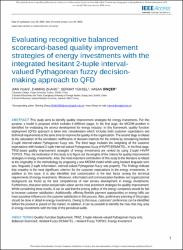| dc.contributor.author | Yuan, Jian | |
| dc.contributor.author | Zhang, Zhi Ming | |
| dc.contributor.author | Yüksel, Serhat | |
| dc.contributor.author | Dinçer, Hasan | |
| dc.date.accessioned | 2020-10-16T07:31:41Z | |
| dc.date.available | 2020-10-16T07:31:41Z | |
| dc.date.issued | 2020 | en_US |
| dc.identifier.citation | Yuan, J., Zhang, Z. M., Yüksel, S. ve Dinçer, H. (2020). Evaluating recognitive balanced scorecard-based quality improvement strategies of energy investments with the integrated hesitant 2-tuple interval-valued pythagorean fuzzy decision-making approach to QFD. IEEE Access, 8, 171112-171128. https://dx.doi.org/10.1109/ACCESS.2020.3023330 | en_US |
| dc.identifier.issn | 2169-3536 | |
| dc.identifier.uri | https://dx.doi.org/10.1109/ACCESS.2020.3023330 | |
| dc.identifier.uri | https://hdl.handle.net/20.500.12511/5925 | |
| dc.description.abstract | This study aims to identify quality improvement strategies for energy investments. For this purpose, a model is proposed which includes 4 different stages. In the first stage, the MCDM problem is identified for evaluating the service development for energy industry. In this framework, quality function deployment (QFD) approach is taken into consideration which includes both customer expectations and technical requirements at the same time to improve the quality in the organization. The second stage is related to the calculation of the correlation coefficients of decision matrices for the criteria by considering hesitant 2-tuple interval-valued Pythagorean fuzzy sets. The third stage includes the weighting of the customer expectations with hesitant 2-tuple interval-valued Pythagorean fuzzy (HIVPF) DEMATEL. In the final stage, TRIZ-based quality improvement strategies of energy investments are ranked by using 2-tuple HIVPF TOPSIS. Thus, the motivation of this study is to figure out the weights of the criteria for quality improvement strategies in energy investments. Also, the most important contribution of this study to the literature is related to the originality in the methodology by proposing a new MCDM model while using hesitant linguistic term sets, linguistic 2-tuple information, interval-valued Pythagorean fuzzy sets properly. The findings indicate that empathy is the most significant criterion for the customer expectations in the energy investments. In addition to this issue, it is also identified that customization is the best factor among the technical requirements of energy investments. Moreover, information and communication facilities and organizational background are found as the best competencies of new service development in energy investments. Furthermore, that prior action and periodic action are the most prominent strategies for quality improvement. While considering these results, it can be said that the pricing policy of the energy companies should be fair to increase customer satisfaction. Additionally, offering flexible payment opportunities on energy bills can have a positive influence on the customer satisfaction in this process. Also, preliminary planning of the project should be done in detail in energy investments. Owing to this issue, customers' preferences can be identified before the product is placed on the market. In addition, it can be possible to identify the risks that may arise in energy investments with the help of the periodical audits. | en_US |
| dc.language.iso | eng | en_US |
| dc.publisher | IEEE-Institute of Electrical and Electronics Engineers | en_US |
| dc.rights | info:eu-repo/semantics/openAccess | en_US |
| dc.rights | Attribution 4.0 International | * |
| dc.rights.uri | https://creativecommons.org/licenses/by/4.0/ | * |
| dc.subject | Investment | en_US |
| dc.subject | Companies | en_US |
| dc.subject | Quality Function Deployment | en_US |
| dc.subject | Customer Satisfaction | en_US |
| dc.subject | Fuzzy Sets | en_US |
| dc.subject | Linguistics | en_US |
| dc.subject | Industries | en_US |
| dc.subject | Quality Function Deployment | en_US |
| dc.subject | TRIZ | en_US |
| dc.subject | 2-Tuple Interval-Valued Pythagorean Fuzzy Sets | en_US |
| dc.subject | Balanced Scorecard | en_US |
| dc.subject | Hesitant Fuzzy Dematel | en_US |
| dc.subject | Hesitant Fuzzy TOPSIS | en_US |
| dc.subject | Energy Investment | en_US |
| dc.title | Evaluating recognitive balanced scorecard-based quality improvement strategies of energy investments with the integrated hesitant 2-tuple interval-valued pythagorean fuzzy decision-making approach to QFD | en_US |
| dc.type | article | en_US |
| dc.relation.ispartof | IEEE Access | en_US |
| dc.department | İstanbul Medipol Üniversitesi, İşletme ve Yönetim Bilimleri Fakültesi, Uluslararası Ticaret ve Finansman Bölümü | en_US |
| dc.authorid | 0000-0002-9858-1266 | en_US |
| dc.authorid | 0000-0002-8072-031X | en_US |
| dc.identifier.volume | 8 | en_US |
| dc.identifier.startpage | 171112 | en_US |
| dc.identifier.endpage | 171128 | en_US |
| dc.relation.publicationcategory | Makale - Uluslararası Hakemli Dergi - Kurum Öğretim Elemanı | en_US |
| dc.identifier.doi | 10.1109/ACCESS.2020.3023330 | en_US |
| dc.identifier.wosquality | Q2 | en_US |
| dc.identifier.scopusquality | Q1 | en_US |



















